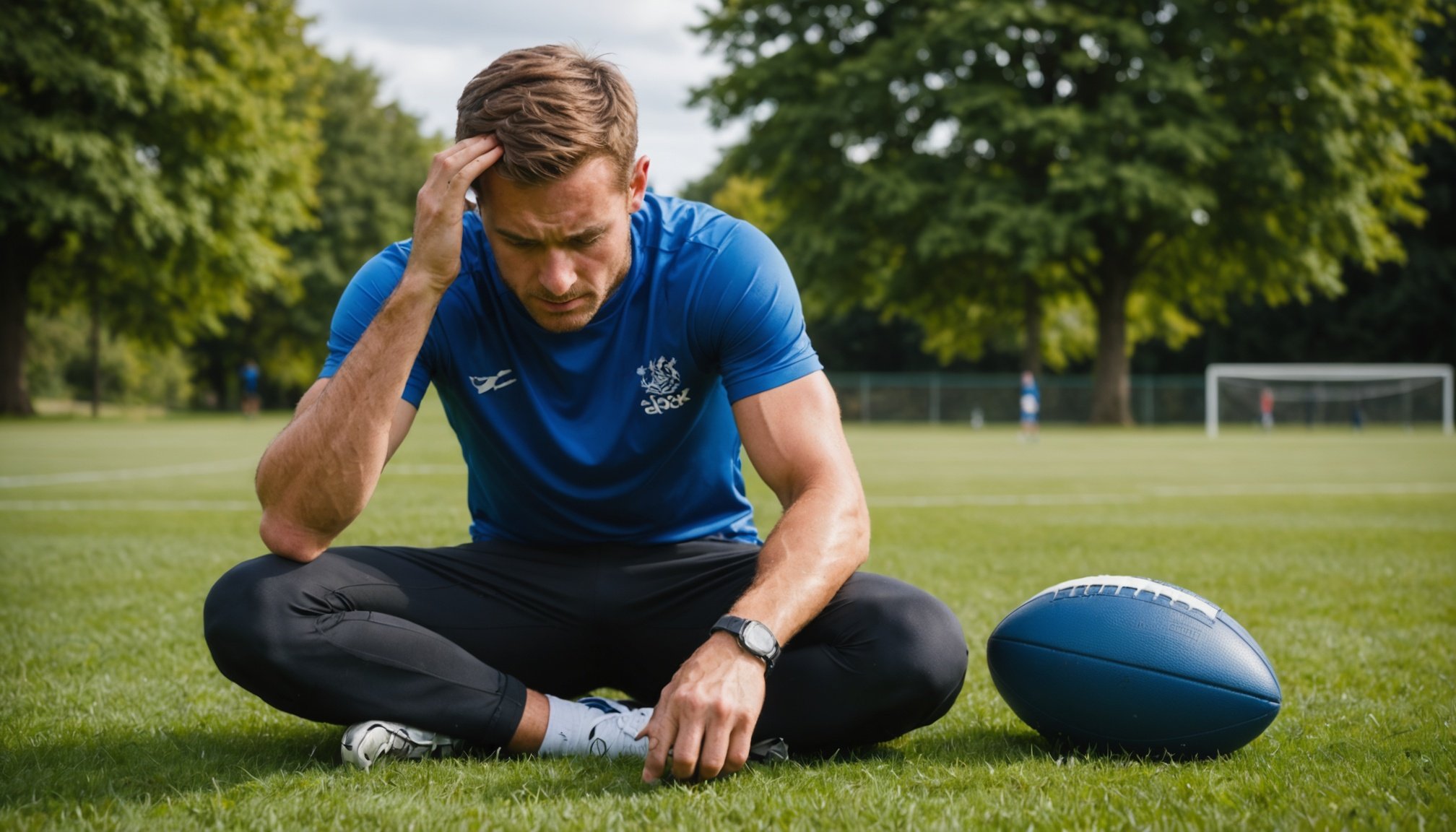Understanding Anxiety in Athletes
Anxiety in athletes is a growing concern, especially among those competing at high levels. It can significantly impact mental health and performance. Athletes often encounter stressors such as competitive pressure and public scrutiny, which can exacerbate anxiety symptoms. In the UK sports context, these challenges are compounded by cultural expectations and performance benchmarks that athletes are pressured to meet.
The effects of anxiety on athletes’ performance can range from impaired focus to decreased stamina. Anxiety may manifest as nervousness before a big game or as chronic stress that affects training consistency. This is particularly concerning for UK athletes, who are often seen as representatives on the global stage.
In the same genre : Navigating climate obstacles: key tactics for uk sports teams gear up for international competitions
Addressing mental health in sports is crucial not only for performance enhancement but also for the well-being of athletes. Implementing strategies and support systems, like sports psychologist consultations and mental resilience workshops, can aid in managing anxiety. Emphasizing the importance of mental health resources in UK sports settings can foster a supportive environment where athletes feel comfortable seeking help. The integration of mental health initiatives in sports organizations is essential for promoting both athlete wellness and optimal performance.
Mindfulness Techniques for Athletes
Incorporating mindfulness practices into an athlete’s routine can be a valuable asset for stress reduction and performance enhancement. Mindfulness, a focused awareness on the present moment, offers athletes tools to maintain calm under pressure and improve their performance consistency.
Also to see : Fostering tomorrow”s leaders: how uk youth sports initiatives cultivate leadership abilities in young athletes
Benefits of Mindfulness in Sports
Mindfulness aids in balancing the mental and physical demands of athletic pursuits. For example, techniques like meditation and visualization allow athletes to focus better during competitions, leading to improved outcomes. The practice can also help in stress reduction by cultivating self-awareness and emotional regulation, essential for peak performance.
Mindfulness Practices for Daily Life
Athletes can incorporate daily practices such as guided meditation, breathing exercises, or mindfulness walks. These practices encourage present-mindedness and reduce anxiety. Consistent engagement in these activities helps athletes be more centred, both in their sport and personal lives.
Mindfulness Apps and Resources in the UK
A variety of tools are available to aid athletes in their mindfulness journey. Resources like Calm and Headspace offer virtual sessions tailored to athletic needs. In addition, the UK hosts a range of local mindfulness classes and online platforms, providing support to athletes interested in exploring this beneficial practice.
Breathing Exercises to Control Anxiety
Breathing techniques have been shown to be effective in managing anxiety, particularly for athletes. By focusing on breath control, athletes can reduce stress and improve performance.
Introduction to Breathing Techniques
Breathing exercises encompass methods such as diaphragmatic breathing and box breathing, which focus on slow, controlled breaths. These techniques aid in calming the nervous system, creating a relaxation response. Diaphragmatic breathing encourages deep breathing by engaging the diaphragm, leading to greater relaxation. Box breathing, on the other hand, involves taking slow breaths in a 4-4-4-4 pattern and is excellent for improving focus.
Practical Breathing Exercises for Athletes
For athletes, integrating exercises like diaphragmatic breathing and box breathing before competitions can be incredibly beneficial. These exercises help manage pre-competition nerves by promoting calmness and focus. For training sessions, incorporating breathing exercises can enhance endurance and performance.
Frequency and Timing of Breathing Practices
To fully realise the benefits, athletes should practice breathing exercises regularly. Implementing these methods during warm-ups and cool-downs ensures consistent anxiety management and relaxation. Adopting a scheduled practice routine helps in ingraining these techniques into daily life, reinforcing their calming effects.
Physical Activity Recommendations
Engaging in regular exercise is paramount for improving both physical health and mental well-being. For those grappling with anxiety, certain types of physical activities can be particularly effective. Aerobic exercises like running or cycling boost endorphins, aiding in anxiety relief. Activities such as yoga combine physical movement with controlled breathing, fostering both relaxation and strength. Strength training is also beneficial, as it improves body confidence and reduces stress by releasing pent-up energy.
Types of Physical Activities that Alleviate Anxiety
Participating in a diverse range of exercises supports overall health and enables athletes to find their personally most effective anxiety reducer. Aerobic activities elevate mood, while yoga offers mindfulness benefits alongside physical flexibility. Meanwhile, strength training alleviates anxiety by focusing on repetitive, grounding movements.
The Role of Regular Exercise in Mental Health
Regular physical activity plays a crucial role in mitigating anxiety symptoms. Consistent routines lead to more balanced mental states, improved sleep, and enhanced concentration. These, in turn, contribute to long-term anxiety management, showing the strong connection between physical fitness and mental health.
UK-Specific Programs and Groups
In the UK, numerous local exercise groups promote community and wellness, offering structured programs helmed by professionals. Joining these initiatives encourages accountability and provides a support network, enriching both physical and mental health.
Mental Strategies for Coping with Pressure
Addressing mental resilience is key when facing pressure in sports. A resilient mindset allows athletes to overcome challenges and maintain performance. Techniques for developing resilience include positive affirmations, goal-setting, and visualization. Positive affirmations help counter negative thoughts, enhancing confidence. Goal-setting ensures focus, breaking larger tasks into manageable steps. Visualization encourages mental rehearsal, preparing athletes for varied scenarios.
When managing competition pressure, athletes can employ specific coping strategies. These include mindfulness, breathing techniques, and grounding exercises. Mindfulness fosters present-focused awareness, reducing stress. Breathing techniques such as diaphragmatic breathing calm the nervous system, promoting relaxation. Grounding exercises keep athletes connected to reality, mitigating anxiety.
The UK offers various psychological support services for athletes. Counseling services and mental health hotlines provide accessible and confidential assistance. UK-based sports psychologists offer tailored programs, focusing on coping strategies and emotional resilience. Engaging with these resources helps athletes build robust mental fortitude while maintaining well-being.
By integrating these strategies, athletes can navigate pressure effectively, enhancing performance and mental health. Access to professional support ensures they are equipped to handle high-pressure situations sustainably.
Testimonials and Expert Insights
Athletes often share their personal experiences with anxiety, shedding light on the challenges they face. These stories offer not only inspiration but also practical insights into managing mental health effectively. Within the UK sports scene, many athletes have found success by implementing techniques such as mindfulness, breathing exercises, and structured physical activities into their routines.
Personal Stories from UK Athletes
UK athletes frequently discuss overcoming anxiety through dedicated mental health strategies. For example, a renowned footballer might recount using mindfulness and controlled breathing to stay focused during high-pressure matches. Such techniques have proven to enhance concentration and reduce stress, helping athletes perform at their best.
Expert Commentary on Anxiety Management Techniques
Sports psychologists and mental health professionals provide valuable perspectives on anxiety management. They often endorse a mix of mindfulness, resilience-building exercises, and professional support to aid athletes. These experts underline the importance of tailored strategies that align with individual challenges faced by athletes, enhancing both mental health and performance.
Community Resources for Athletes
UK athletes have access to numerous community resources that provide guidance and support. Utilizing these resources can be pivotal for athletes seeking to enhance their well-being. Local mental health workshops and online platforms offer practical tools and a supportive network, empowering athletes to navigate anxiety successfully.











